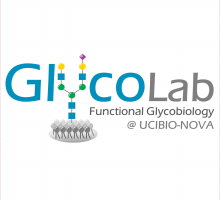Research Activity
 |
Angelina PalmaCiência ID: 6719-0FF9-816Aemail: angelina.palma@fct.unl.pt |
The journey into the Glycosciences Field
I am a Research Assistant Professor in Glycosciences at UCIBIO (Research Unit on Applied Molecular Biosciences), School of Science and Technology, NOVA University of Lisbon (FCT-NOVA). I am also an Honorary Research Fellow at Imperial College London. I obtained my degree in Biochemistry in 2001 from the University of Algarve, Portugal, and completed my PhD degree in Biochemistry in 2007 from ITQB-NOVA I joined the Glycosciences Laboratory of Prof. Ten Feizi (Imperial College London), first as visiting scholar (2004-2005) during my PhD and thereafter as a post-doctoral fellow (2007-2009), funded by the Portuguese FCT. While at the Glycosciences Lab, I developed pioneering work in designer glycan microarray approaches to study glycan recognition systems of biological and biomedical impact and in the setting-up of a state-of-the-art glycan microarray and in its application to glycan-ligand discovery.
I returned to Portugal end 2009 and joined the protein crystallography group of Prof. Maria João Romão at FCT-NOVA. Here I implemented the glycan microarray technology combined with X-Ray crystallography to study endogenous lectin recognition systems and microbial glycan degradation of complex polysaccharides (bacterial cellulosomes). In 2013, I was awarded a 5-year Starting Grant under the highly competitive FCT Investigator international call, which allowed me to start my independent journey and set-up a glycan microarray laboratory, supported by 2 research project grants from Portuguese FCT. This enabled me to train Master and PhD students in Glycosciences, establish key collaborations and attract competitive funds to establish a line of research in Functional Glycobiology at UCIBIO.
RESEARCH MOTIVATION
Glycans are ubiquitous molecules and their structures and functions are highly diverse, representing a largely undiscovered resource for biological applications and novel therapeutic opportunities. Glycan microarrays are now state-of-the-art methods in modern Glycosciences to identify novel glycan-binding proteins and pinpoint glycan function.
The focus of my research has been on developing and applying glycan microarrays to interrogate glycomes and proteomes leading to 1) glycan ligand discovery and function, and 2) unravelling of glycan-recognition systems. I am following integrative approaches combining glycan-microarrays with complementary methodologies such as X-ray crystallography, NMR and other biophysical techniques to study the biomolecular interaction. These have been applied to study endogenous and microbial glycan recognition systems, glycan-mediated pathogen-host interactions and antibodies for cancer diagnosis and therapy.
TEACHING
Since 2010, I have been enrolled in teaching Biochemistry and Metabolism at the Biochemistry Section at FCT-NOVA. I am also a scientific advisor and teacher of the e-learning course Glycobiology and Glycochemistry and I started in 2017 the Curricular Unit Glycobiology and Disease, which is given to the Master programs in Biochemistry and Molecular Genetics and Biomedicine.
